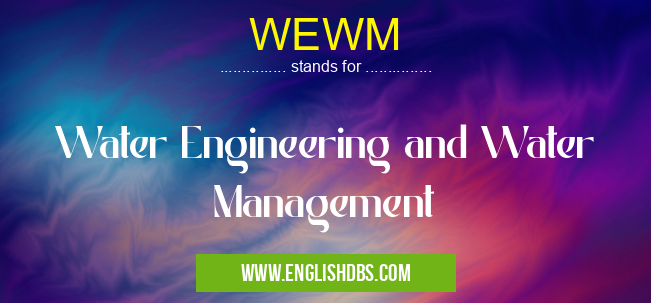What does WEWM mean in MANAGEMENT
Water Engineering and Water Management, abbreviated as WEWM, is a field of engineering dedicated to the protection, optimization and supply of water resources for various industrial, agricultural and residential applications. It typically combines infrastructure development such as dams, irrigation networks or reservoirs with integrated management solutions such as water conservation methods and proper wastewater treatment. This multi-disciplinary field requires expertise in planning, design, construction, operation and maintenance of water projects for efficient use of water resources.

WEWM meaning in Management in Business
WEWM mostly used in an acronym Management in Category Business that means Water Engineering and Water Management
Shorthand: WEWM,
Full Form: Water Engineering and Water Management
For more information of "Water Engineering and Water Management", see the section below.
» Business » Management
Components
The term ‘water engineering’ refers to the entire process associated with designing, constructing and managing a network of infrastructure components including dams, reservoir systems or irrigation networks. The term ‘water management’ is broader in scope and describes all activities related to controlling water sources throughout a region or watershed such as watershed planning initiatives to ensure sustainable use of available resources. WEWM encompasses both aspects in order to identify the most cost-effective solutions that meet sustainability goals while still providing necessary services for users such as clean drinking water or irrigation for agriculture.
Objectives
The primary objective of WEWM is to maximize efficiency in the use of available water resources while minimizing environmental impacts such as land degradation or pollution occurrence from inadequate wastewater treatments. Other objectives include increasing access to safe drinking water for communities in need, improving agriculture productivity by utilizing appropriate irrigation techniques, protecting aquatic ecosystems by conserving existing biodiversity and ensuring adequate supplies during periods of prolonged drought.
Technical Considerations
Technical considerations in WEWM can be divided into two main categories - hydrological and hydraulic engineering operations related to management of surface water bodies; and control systems related to distribution networks that transport potable (drinking) water from its source (e.g., a dam) to users (e.g., homes). Hydrological activities involve analysis related to flow patterns; whereas hydraulic engineering deals with the design principles necessary for constructing channels or dams according to safety regulations regarding structural capacity (e.g., maximum loading). Distribution networks require optimization strategies related to pressure levels at different points along the network as well as control mechanisms for system maintenance involving monitoring equipment connected through an automated computerized system known as SCADA (Supervisory Control And Data Acquisition).
Essential Questions and Answers on Water Engineering and Water Management in "BUSINESS»MANAGEMENT"
In summary, WEWM is an interdisciplinary area combining civil engineering principles along with ecological concepts associated with preservation of natural habitats that depend on availability of suitable aquatic environments - both managed by humans due to population growth alongside technological advances allowing manipulation of natural phenomena in order meet human needs more efficiently than ever before.
